The reduction in lithium costs may be a welcome respite to EV manufacturers looking to cut costs in order to make EVs more affordable to consumers.
The rise of EVs has been hampered by high production costs, which translate to higher retail prices. As a result, EVs have been seen as a luxury item, out of reach for many consumers.
With the drop in lithium prices, manufacturers can now explore options for producing affordable EVs. In the past, the high cost of batteries has been blamed for the high price of EVs. This cost covers not only lithium but also other components such as cobalt, nickel, and manganese. However, the reduction in the cost of lithium is encouraging news for manufacturers when it comes to the battery component of EVs.
Cheaper lithium is not just good news for EV manufacturers but also for energy storage firms looking to expand their operations. Lithium-ion batteries are widely used in various energy storage applications, including off-grid and or grid-connected projects, such as residential energy storage systems, large commercial installations, and utility-scale operations. The reduction in lithium prices means that energy storage firms can purchase the batteries needed for their specific applications at a lower cost, which in turn, can filter down to consumers, making energy storage more affordable.
This however is negative news for Zimbabwe which still has Lithium reserves that have not yet found large-scale takers despite overwhelming interest from Small-scale Miners. The country does have upcoming projects but these will take time to get off the ground and as time goes by prices will continue to plummet.
Government in December 2022 halted the acceptance and processing of applications for lithium and other minerals which it deemed strategic.
“Further, we have of late seen a flooding of applications for mining titles for minerals which have been deemed strategic in the upcoming Mines and Minerals Amendment Bill. It has thus become necessary that in the national interest, we temporarily stop acceptance and processing of applications for mining titles for the following minerals until further notice: diamonds, copper, lithium, nickel (and) rare earth minerals,” Mines and Mining Development Permanent Secretary Mr Pfungwa Kunaka said in a statement to all Provincial Mining directors.
It is not clear if this restriction will be lifted if the Mines Bill does not sail through.
The drop in lithium prices has been attributed to several factors, including increased production and supply from Australia, Chile, and Argentina. Analysts predict that the supply of lithium will continue to rise even as demand increases due to the growth of EVs and energy storage systems.




